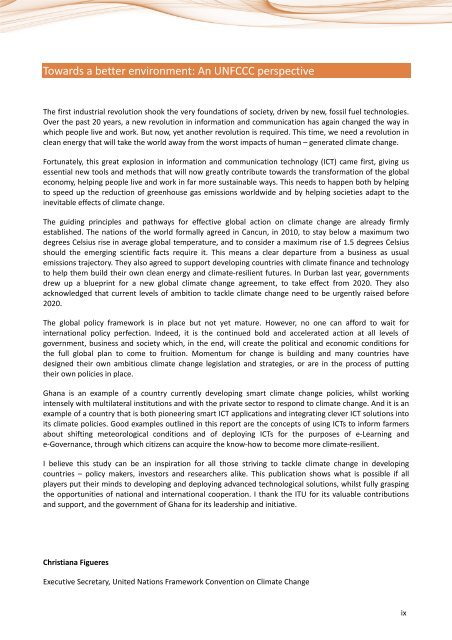Information and communication technologies (ICTs) and ... - ITU
Information and communication technologies (ICTs) and ... - ITU
Information and communication technologies (ICTs) and ... - ITU
Create successful ePaper yourself
Turn your PDF publications into a flip-book with our unique Google optimized e-Paper software.
Towards a better environment: An UNFCCC perspective<br />
The first industrial revolution shook the very foundations of society, driven by new, fossil fuel <strong>technologies</strong>.<br />
Over the past 20 years, a new revolution in information <strong>and</strong> <strong>communication</strong> has again changed the way in<br />
which people live <strong>and</strong> work. But now, yet another revolution is required. This time, we need a revolution in<br />
clean energy that will take the world away from the worst impacts of human – generated climate change.<br />
Fortunately, this great explosion in information <strong>and</strong> <strong>communication</strong> technology (ICT) came first, giving us<br />
essential new tools <strong>and</strong> methods that will now greatly contribute towards the transformation of the global<br />
economy, helping people live <strong>and</strong> work in far more sustainable ways. This needs to happen both by helping<br />
to speed up the reduction of greenhouse gas emissions worldwide <strong>and</strong> by helping societies adapt to the<br />
inevitable effects of climate change.<br />
The guiding principles <strong>and</strong> pathways for effective global action on climate change are already firmly<br />
established. The nations of the world formally agreed in Cancun, in 2010, to stay below a maximum two<br />
degrees Celsius rise in average global temperature, <strong>and</strong> to consider a maximum rise of 1.5 degrees Celsius<br />
should the emerging scientific facts require it. This means a clear departure from a business as usual<br />
emissions trajectory. They also agreed to support developing countries with climate finance <strong>and</strong> technology<br />
to help them build their own clean energy <strong>and</strong> climate-resilient futures. In Durban last year, governments<br />
drew up a blueprint for a new global climate change agreement, to take effect from 2020. They also<br />
acknowledged that current levels of ambition to tackle climate change need to be urgently raised before<br />
2020.<br />
The global policy framework is in place but not yet mature. However, no one can afford to wait for<br />
international policy perfection. Indeed, it is the continued bold <strong>and</strong> accelerated action at all levels of<br />
government, business <strong>and</strong> society which, in the end, will create the political <strong>and</strong> economic conditions for<br />
the full global plan to come to fruition. Momentum for change is building <strong>and</strong> many countries have<br />
designed their own ambitious climate change legislation <strong>and</strong> strategies, or are in the process of putting<br />
their own policies in place.<br />
Ghana is an example of a country currently developing smart climate change policies, whilst working<br />
intensely with multilateral institutions <strong>and</strong> with the private sector to respond to climate change. And it is an<br />
example of a country that is both pioneering smart ICT applications <strong>and</strong> integrating clever ICT solutions into<br />
its climate policies. Good examples outlined in this report are the concepts of using <strong>ICTs</strong> to inform farmers<br />
about shifting meteorological conditions <strong>and</strong> of deploying <strong>ICTs</strong> for the purposes of e-Learning <strong>and</strong><br />
e-Governance, through which citizens can acquire the know-how to become more climate-resilient.<br />
I believe this study can be an inspiration for all those striving to tackle climate change in developing<br />
countries – policy makers, investors <strong>and</strong> researchers alike. This publication shows what is possible if all<br />
players put their minds to developing <strong>and</strong> deploying advanced technological solutions, whilst fully grasping<br />
the opportunities of national <strong>and</strong> international cooperation. I thank the <strong>ITU</strong> for its valuable contributions<br />
<strong>and</strong> support, <strong>and</strong> the government of Ghana for its leadership <strong>and</strong> initiative.<br />
Christiana Figueres<br />
Executive Secretary, United Nations Framework Convention on Climate Change<br />
ix

















